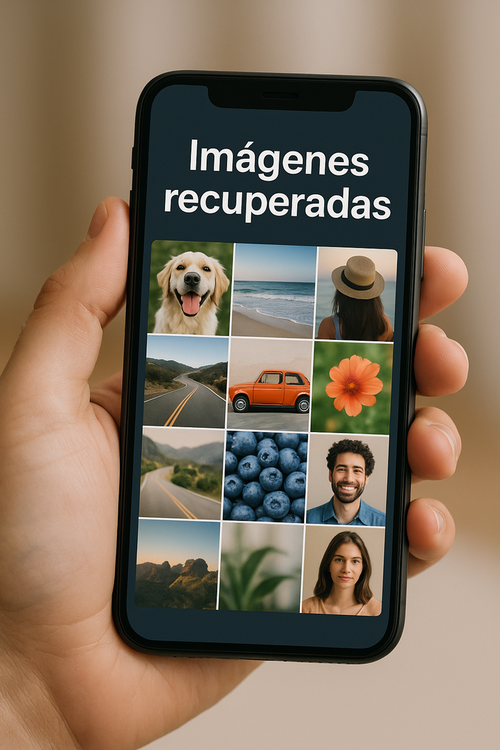Have you ever needed to recover deleted photos from your phone and thought there was no solution?
Discover a powerful tool that can fix it in just minutes: DiskDigger.
Safe, lightweight, and trusted by millions of users, DiskDigger has already helped many people recover precious memories and important data — and it can help you too. If you want to make sure nothing important gets left behind, now is the time to act.
Before you download, check out the main benefits of DiskDigger — and see why it has become one of the most popular apps for recovering deleted photos:
You will remain in the same website
Is DiskDigger Worth It? See the Pros and Cons Before You Decide
Losing digital files — whether photos, videos, or documents — is more common than you might think. A simple wrong tap, a system crash, or an unexpected memory card formatting can delete, in seconds, important records from your personal or professional life.
To handle that, DiskDigger has become one of the most sought-after solutions for those needing to recover deleted files easily. It promises to scan your device’s memory and restore content that once seemed permanently lost.
But does it really deliver? And what are the strengths and limitations of this tool?
Below is a complete analysis of DiskDigger’s key advantages and disadvantages, with detailed explanations to help you decide whether it’s the right option for your needs.
Main Advantages of DiskDigger
1. Simple and user-friendly interface
One of DiskDigger’s biggest strengths is its usability. The app was designed with accessibility in mind, allowing anyone to use it without technical knowledge. Navigation is intuitive, menus are straightforward, and the scanning and recovery process takes just a few steps. This makes it ideal for both beginners and users looking for speed and simplicity.
2. Recovers various file types
Although best known for photo recovery, DiskDigger is more versatile than it seems. Depending on the version (free or Pro), it can also recover videos, text documents, PDFs, spreadsheets, audio files, and other common formats. This makes it a comprehensive solution for different data loss scenarios, especially involving SD cards or device failures.
3. Works without root (with limitations)
DiskDigger can be used on Android devices without requiring root access, which is a plus for users who don’t want to or don’t know how to root their phone. While root access allows deeper scanning and better results, the app can still recover thumbnails or cached versions of images — which is enough for many users.
4. Available for Android and computers
Another advantage is its cross-platform compatibility. DiskDigger is available for both Android smartphones and computers running Windows or Linux. This allows recovery of files from various sources such as phones, flash drives, memory cards, and external hard drives, making it a flexible recovery solution.
5. Functional free version
DiskDigger’s free version is already capable of recovering photos in many simple cases. This allows users to test the tool, see how it works, and only then decide whether to upgrade to the paid version. For many, the basic version already solves the issue quickly and affordably.
6. High success rate for recent deletions
When used shortly after a file is deleted, DiskDigger tends to have a high recovery success rate. That’s because the data hasn’t yet been overwritten by new files, and the app can locate intact data blocks. Acting quickly is essential for the best results.
7. Lightweight and good performance
Despite its robust features, DiskDigger is a lightweight app that doesn’t consume much system memory and runs well even on older devices. It’s a great option for users looking for a fast, stable solution that doesn’t slow down their phone or PC.
8. No registration required
The app doesn’t ask for account creation, login, or personal data submission. This makes the experience more direct, private, and secure, giving users full control over the recovery process.
Disadvantages of DiskDigger You Should Consider
1. Limitations on non-rooted Android devices
Although it works without root, DiskDigger has some clear limitations in this mode. Recovery is often restricted to low-resolution images or cached files, which may not meet user expectations. For a full system scan and deeper recovery, root access is almost essential — though not always feasible or advisable.
2. Deep scans can be time-consuming
When performing a full scan, the process can take quite a while, especially on devices with large storage or high file turnover. The app needs to analyze thousands of data blocks to find recoverable files, which requires time and patience.
3. Unorganized scan results
Recovered files don’t always appear with their original names, dates, or folder structures. In deep scans, for instance, files might be fragmented or lack clear identifiers, making it harder to sort and filter through results. Users need to manually review the files found to locate what they’re actually looking for.
4. Recovery is not guaranteed
Like any data recovery software, DiskDigger can’t restore files that have already been overwritten. If the device has been heavily used since the deletion, chances are those files are gone for good. In such cases, no tool — however advanced — can recover them.
5. Some recovered files may be corrupted
In some cases, recovered files may be incomplete or corrupted, making them unusable. This typically happens when parts of the file have already been overwritten or damaged, preventing full recovery.
6. More technical interface on desktop version
While the mobile app is very user-friendly, the computer version has a more technical interface. This might be confusing for users unfamiliar with file systems or data recovery terminology, and it may require extra care when operating.
Conclusion: Is DiskDigger the Right Tool for You?
DiskDigger is undoubtedly one of the most accessible and efficient tools for recovering deleted files — especially photos. Its friendly interface, multi-platform compatibility, and functional free version make it a solid choice for everyday users seeking a quick and simple solution.
However, it’s important to approach the tool with realistic expectations. On non-rooted Android devices, its capabilities are limited, and even with root, recovery is never 100% guaranteed. As with any recovery software, success depends largely on how quickly you act and how much the storage space has been used since the deletion.
That said, DiskDigger is absolutely worth a try — especially when used promptly after files are lost. It offers a real chance to recover valuable memories or important documents that might otherwise be gone forever.
If you want to learn how to use DiskDigger correctly, understand which version is right for you, and increase your chances of recovering deleted content, read our full article with a complete step-by-step guide.
Yes, DiskDigger is effective at recovering deleted photos, especially when used shortly after the deletion. It scans the device’s memory for files that haven’t been overwritten and can restore them quickly. The free version works well for basic needs, while the Pro version offers more advanced features. Want to understand how it works and boost your chances of success? Read the full article now!
Not necessarily. DiskDigger works without root, but with some limitations. Without root, it can recover lower-resolution versions of deleted photos. With root access, the app can scan deeper areas of the system, increasing the recovery efficiency and file variety. Learn when root access is worth it and how the app works in each case in the full article. Check it out now!
Beyond photos, DiskDigger can recover videos, documents, spreadsheets, audio files, and more — depending on the scan type and version used. It’s a versatile solution for many data loss situations. Want to know exactly what files you can recover with the app? See the complete list in the full article!
Yes, DiskDigger is considered safe and reliable. It doesn’t require registration, doesn’t access sensitive user data, and works transparently by showing which files can be recovered and in what condition. Always download the official version. Learn more about the app’s safety, performance, and reliability in the full article. Access to read!

